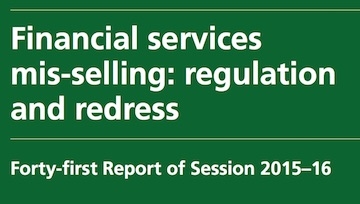The FCA has failed to do enough to tackle the cultural problems behind mis-selling by finance firms, a committee of MPs has concluded.
The Committee of Public Accounts warned in a report, published today, that the pensions freedoms reforms are a “potential trigger for future mass mis-selling”.
The risks of mis-selling remain, the group said, as it also criticised the regulator for lacking action to ensure that consumers “understand the financial products they are buying and the possibility of claiming compensation”.
The FCA and the Treasury must do more to know how much mis-selling is happening now, and which regulatory activities work best to prevent it, MPs said.
The report, entitled Financial services mis-selling: regulation and redress, stated: “The FCA has not done enough to tackle the cultural problems that lie behind mis-selling by financial services firms. The cultures of firms and the nature of their sales incentives have been identified as key factors behind mis-selling.”
The committee acknowledged the FCA had taken some action to deal with root causes, including promoting changes to firms’ incentive structures, better training of financial advisers and the Senior Managers Regime.
The report said: “But the risks of mis-selling remain, for example pensions freedoms reforms are a potential trigger for future mass mis-selling. Middle managers in financial services firms were often promoted on the basis of achieving sales targets, making it hard to embed more customer-focussed approaches.
“The FCA has withdrawn a planned review of banks’ culture, but has not articulated what culture it expects firms to have. There is no guarantee that any improvements in cultures will stick as the regulatory spotlight moves away.”
The report recommended the FCA should outline the actions it will take to improve cultures in financial services firms, and report to MPs on their effectiveness in a year’s time.
The committee also warned that “product innovation can also make mis-selling more likely”, after the FCA told MPs it welcomes innovative work in this area, for example in pensions.
The report claimed that the FCA “does not do enough to ensure that consumers understand the financial products they are buying and the possibility of claiming compensation”.
Even the most knowledgeable consumers find financial services complex to understand, meaning that consumers can be particularly susceptible to mis-selling, MPs said.
The report stated that the FCA and the Ombudsman “do not appear to have sufficiently considered greater use of automatic enrolment of victims of mis-selling into compensation schemes”.
It recommended the FCA “should set out what more it will do ensure firms check consumer understanding of the products they purchase and of their rights to claim compensation, particularly for vulnerable consumers, and report back to us on this work in a year’s time”.
MPs also concluded that the Treasury does not know how effective the FCA is in reducing mis-selling, and there are no good indicators of the current level of mis-selling.
Complaints data provides an “imperfect indicator of current mis-selling levels” because complaints may reflect past mis-selling rather than continued problems, the report said.
The Treasury and the FCA were told by the committee they should develop ‘real-time’ indicators of the extent of mis-selling, and assess regularly how effective their actions are in reducing it.

